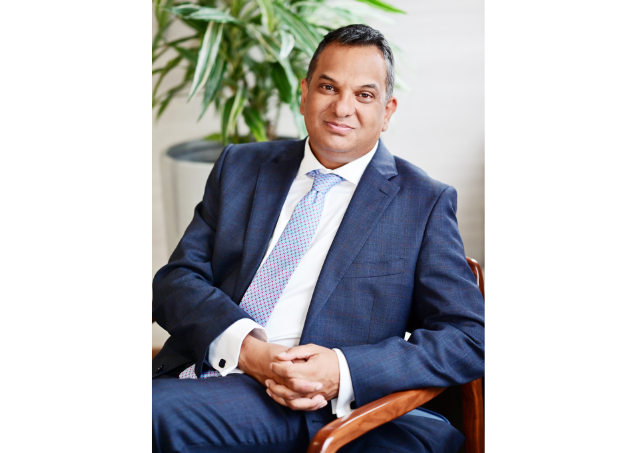Private Wealth has evolved into an integral segment of the banking and financial services sector, says Sanjaiye Rawoteea, Head of Consumer Banking, Private Banking and Wealth Management at SBM Bank Mauritius, and Mauritius is on the right track to bolster its image as an International Financial Centre and attract more and more High-Net-Worth Individuals (HNWIs).

The Blueprint for the Mauritius financial services sector identified that Mauritius could be a ‘compelling home’ for private wealth, noting that private banking and wealth management represent the third-largest sector of the Mauritius International Financial Centre. How would you describe the private wealth landscape in Mauritius currently?
Mauritius has boasted a solid growth over the last decade with its GDP per capita being second in Africa in 2020 according to the World Bank. Against this backdrop, Private Wealth has evolved into an integral segment of the banking and financial services sector. The Private Wealth segment has also spurred growth in other sectors such as Real Estate and Luxury Services, among others. We remain confident that, despite the recent challenges and economic constraints, the Private Wealth segment will continue its upward trajectory, with Mauritius being on the right track to bolster its image as an International Financial Centre and attract more and more High-Net-Worth Individuals (HNWIs).
What are some of the advantages that Mauritius has to offer to HNWIs looking for wealth management solutions?
The country has a robust banking and financial services sector with global networks that allow for world-class solution offerings. Our banking sector is generally well capitalised and highly liquid. The banking and financial services sector is also backed by a solid regulatory framework which prescribes sound principles of risk management. These are important factors that allow for the preservation of wealth and create the trust that all HNWIs are looking for while entrusting their deposits to banks.
From another perspective, Mauritius has an effective legal system that safeguards the rights of each and every person. Our other strengths include our political stability, which is laudable, especially compared to many countries across the African continent, and our accommodative pro-business fiscal regime, which is globally competitive. All of these considerations may also help explain why Mauritius is ranked first in Africa on the Ease of Doing Business Index.
In terms of your client base at SBM, are there some specific regions or countries where you are witnessing particularly high demand for wealth management solutions based in Mauritius?
SBM has transitioned from being a traditional retail bank in its early years to cement its international footprint across Asia and Africa. Over the past five years, we have seen growing demand from African, Asian and European clients across more than 50 countries. Today, a large proportion of SBM’s Private Banking/Wealth segment comprises international clients. I am confident that in line with the country’s vision of operating as a sound and solid International Financial Centre and SBM’s economic importance as well as strategic innovation, our portfolio of international clients will keep on growing.
Which types of wealth management solutions or structures are most popular currently? Do you see potential for growth of family offices in Mauritius in the future?
While the most popular wealth management solutions over the past few months, based on global flows, appear to be risk-on assets such as global equities and cryptocurrencies, it should be highlighted that Wealth Management solutions should, most importantly, fit the client’s requirements, in addition to being simple, convenient and transparent. We, at SBM, embrace a one-stop shop approach whereby financial and related services are available under one roof to provide bespoke solutions to clients. SBM has all the resources and expertise to meet the clients’ specific banking and investment needs. Our offerings transcend traditional investments. In the same vein, we have leveraged our technical expertise in the realm of alternative investments to engineer multiple structured solutions which offer various degrees of capital protection and target different areas of the investment world.
The growth of family offices will be strong in Mauritius since we have the necessary financial solutions, technological resources and legal/regulatory framework to provide a business-friendly environment. The Financial Services Commission has provided for the legal framework for Family Offices effective since 2020. The low capital threshold and tax holiday provided in the regulatory framework, coupled with the competitiveness of doing business in Mauritius, renders the Family Office licence easily accessible to any family wishing to set up a family office. The country has long established the legal framework for corporate structures such as Trusts and Foundations and for asset management, which are quintessential for financial planning and wealth management. Last, but not least, Family Offices can also benefit from the plethora of financial solutions and services on offer that will enable them in the fulfilment of their objectives and lifestyle. SBM has gone the extra mile to be more than a banker; for instance, we will soon launch our concierge services to complement the lifestyle of HNWIs and family offices.
Mauritius has established a residency by retirement scheme for non-citizens to enjoy their retirement years on the island. How do you see the potential of the ‘silver economy’ in Mauritius? What will be the implications for retirement planning solutions offered on the island?
The silver economy is an untapped goldmine that will fuel our economic engine in the long run. Mauritius is a peaceful country with attractive natural features – pristine beaches, lush greenery, for instance – as well as a rich history renowned around the world.
Over the past decade, the country has also diversified its real estate sector through the offering of Luxury residences, from flats to villas. The island has witnessed the transformation of many areas into welcoming hubs for foreigners, whether for the sake of residency or for conducting business. Our inclusive banking and financial services, coupled with other country-specific factors such as our location, should attract many non-citizens, especially from developed economies who may be looking for a change in scenery and climate.
Our retirement planning solutions will have to be tailored to accommodate these specific non-citizens. Our financial services sector is currently globally connected to major institutions that provide investment vehicles for retirement planning solutions for the preservation and growth of wealth. There will also be a growing need for experts in areas such as investment and financial planning, amongst others. That being said, we are confident that the country has the human capital to accommodate these emerging economic pillars.
The wealth management sector has been moving towards greater digitalisation in the light of the pandemic. How has SBM been adapting to this changed environment? What opportunities does digitalisation bring for market players in the wealth management segment and their clients?
The COVID-19 pandemic has underscored the importance of business continuity, digitalization, and cyber security. We understood that those criteria were sine qua non to maintain and strengthen our relationships with our clients. During the strict lockdown in 2020, we adopted the “Work from Home” culture and attended to both the banking and investment needs of our clients.
Going forward, the lesson learned is that the pandemic has accelerated our timeline towards a greater digitalisation of our services. This is why we are laying more emphasis on communication, speed of execution and digitalisation of our services. For example, through our recently setup online client portal, our clients may access their investment portfolios at any time.
Looking ahead, other concepts such as AI-driven robot-advisors may be contemplated in order to offer investment portfolio solutions more efficiently. Digitalisation will undeniably open up more business avenues in the financial sector. Other sectors could also be possible positively affected, where automation will help drive more cost-effective services.
